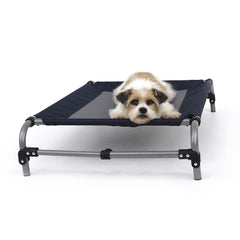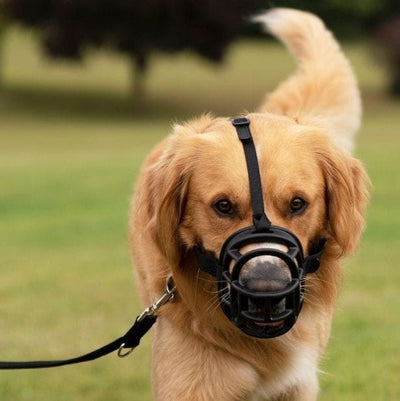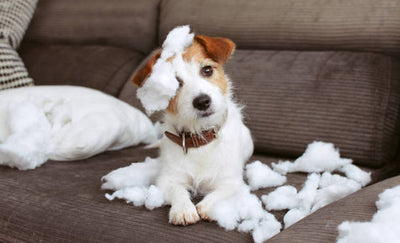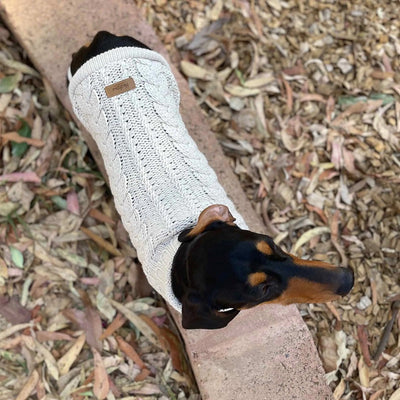
If you're a dog owner, you know that chewing is a natural behaviour for your dog.
However, when your dog starts chewing their bed, it can be frustrating and costly. Chewing on beds can be caused by various factors, including anxiety, boredom, teething, or a general preference for chewing. It's important to identify the underlying cause of your dog's behaviour and address it appropriately. However, it's also important to provide appropriate outlets for chewing, such as durable chew toys, and to address any potential underlying medical or behavioural issues.
Fortunately, there are several ways to stop your dog from destroying their bed and redirect their chewing behavior to more appropriate items.
Provide Appropriate Chew Toys.
One of the most effective ways to stop your dog from chewing their bed is to provide them with appropriate chew toys. Dogs have a natural urge to chew, and providing them with toys that are specifically designed for chewing can help satisfy this urge.
Look for toys that are made of durable materials, such as rubber or nylon, and avoid toys that can easily be torn apart or swallowed. You can also try filling a Kong toy with some peanut butter, wet dog food or other treats to keep your dog occupied and satisfied.
Increase Exercise and Playtime.
Another way to stop your dog from chewing their bed is to increase their exercise and playtime. Dogs that are bored or have excess energy may turn to destructive behaviors, such as chewing. Make sure your dog is getting enough physical activity and mental stimulation throughout the day. Take them for walks, play fetch, or enroll them in a doggy daycare or training class. A tired dog is less likely to chew their bed out of boredom or frustration.
exercise and playtime. Dogs that are bored or have excess energy may turn to destructive behaviors, such as chewing. Make sure your dog is getting enough physical activity and mental stimulation throughout the day. Take them for walks, play fetch, or enroll them in a doggy daycare or training class. A tired dog is less likely to chew their bed out of boredom or frustration.
Ensure that this activity has occurred earlier in the day as it is important to have a routine at nighttime to encourage relaxation and sleep!
Use pet relaxing diffusers.
As a part of your bedtime routine, it may be worthwhile plugging in an adaptor that promotes relaxing pheromones to calm your dog.
Adaptil is a synthetic copy of a pheromone produced by lactating female dogs, which is designed to help reduce stress and anxiety in dogs. It comes in various forms, such as diffusers, collars and sprays. While Adaptil may be helpful in managing stress-related behaviours in some dogs, such as excessive barking, marking, or destructiveness, it may help with chewing beds by calming and settling your dog.
Create a Comfortable Sleeping Environment.
Sometimes, dogs chew their beds because they are uncomfortable or anxious. Make sure your dog's bed is the right size for them and is made of comfortable materials. Consider using a crate for sleeping your dog and adding a cozy crate bed or mattress to make the crate more inviting. A dog that is crate trained is less likely to destroy their bed as they won't have the space.
Additionally, try to create a calm and peaceful sleeping environment for your dog. Keep the room quiet and dark, and consider playing classical or soothing music to cut any outside noises that may be causing your dog to feel anxious.
By having a bedtime routine, your dog will soon overcome or out grow this natural behaviour.
Are there Dog beds Available that are chew-Proof?
It's important to note that no dog bed is truly indestructible, and some persistent chewers may still be able to damage even ones considered to be chew-proof beds. However, these types of beds are generally more durable and resistant to chewing compared to regular dog beds, and can be a good option for dogs with strong chewing tendencies.
We recommend trying a hammock or trampoline style of dog bed. These are made with a metal frame and feature a nylon cover that is attached to the frame tightly. The covers for these beds are replaceable and make an inexpensive choice while your dog is going through a chewing phase! Shop replacement covers here.
Seek Professional Help if Necessary.
If your dog's bed chewing behaviour persists despite your best efforts, it may be time to seek professional help. Your vet or animal behaviourist can help identify any underlying medical or behavioural issues that may be causing the behavior. They can also provide guidance on training techniques. Remember, seeking professional help is a sign of responsible pet ownership and can ultimately lead to a happier and healthier life for your furry friend.
To make an impact on your dog chewing their bed, you may need to use a combination of things as we have outlined in this pet blog. In addition to using Adaptil, you can also try other techniques to discourage your dog from chewing their bed, such as providing alternative chew toys, providing mental and physical stimulation through regular exercise and interactive toys, and using positive reinforcement training to redirect their chewing behaviour to more appropriate items.
© weknowpets 2023









